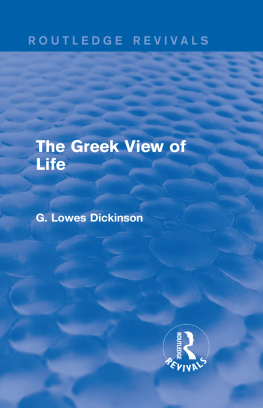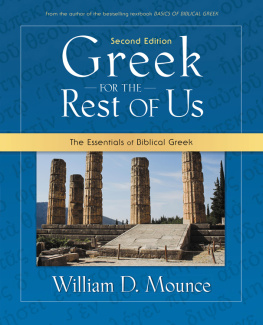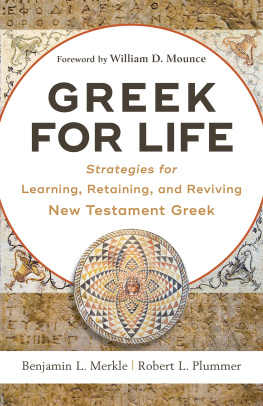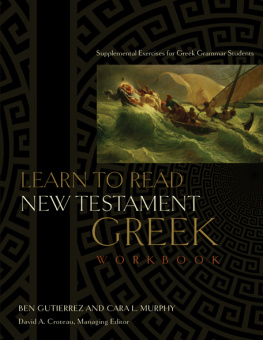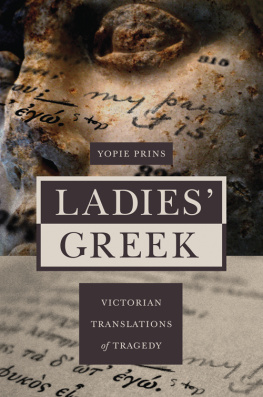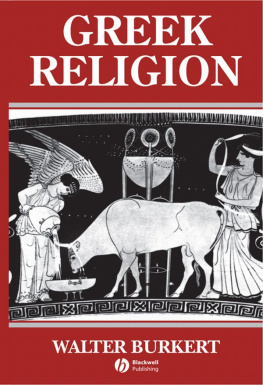Dickinson Goldsworthy Lowes - The Greek View of Life
Here you can read online Dickinson Goldsworthy Lowes - The Greek View of Life full text of the book (entire story) in english for free. Download pdf and epub, get meaning, cover and reviews about this ebook. City: New York;Greece;Oxon England, year: 2016, publisher: Taylor & Francis (CAM);Routledge, genre: Politics. Description of the work, (preface) as well as reviews are available. Best literature library LitArk.com created for fans of good reading and offers a wide selection of genres:
Romance novel
Science fiction
Adventure
Detective
Science
History
Home and family
Prose
Art
Politics
Computer
Non-fiction
Religion
Business
Children
Humor
Choose a favorite category and find really read worthwhile books. Enjoy immersion in the world of imagination, feel the emotions of the characters or learn something new for yourself, make an fascinating discovery.
- Book:The Greek View of Life
- Author:
- Publisher:Taylor & Francis (CAM);Routledge
- Genre:
- Year:2016
- City:New York;Greece;Oxon England
- Rating:5 / 5
- Favourites:Add to favourites
- Your mark:
- 100
- 1
- 2
- 3
- 4
- 5
The Greek View of Life: summary, description and annotation
We offer to read an annotation, description, summary or preface (depends on what the author of the book "The Greek View of Life" wrote himself). If you haven't found the necessary information about the book — write in the comments, we will try to find it.
The Greek View of Life — read online for free the complete book (whole text) full work
Below is the text of the book, divided by pages. System saving the place of the last page read, allows you to conveniently read the book "The Greek View of Life" online for free, without having to search again every time where you left off. Put a bookmark, and you can go to the page where you finished reading at any time.
Font size:
Interval:
Bookmark:
First published in 1886
Twenty-third edition published in 1957
by Methuen & Co. LTD
This edition first published in 2016 by Routledge
2 Park Square, Milton Park, Abingdon, Oxon, OX14 4RN
and by Routledge
711 Third Avenue, New York, NY 10017
Routledge is an imprint of the Taylor & Francis Group, an informa business
1957 Methuen & Co. LTD
The right of G. Lowes Dickinson to be identified as author of this work has been asserted by him in accordance with sections 77 and 78 of the Copyright, Designs and Patents Act 1988.
All rights reserved. No part of this book may be reprinted or reproduced or utilised in any form or by any electronic, mechanical, or other means, now known or hereafter invented, including photocopying and recording, or in any information storage or retrieval system, without permission in writing from the publishers.
Publishers Note
The publisher has gone to great lengths to ensure the quality of this reprint but points out that some imperfections in the original copies may be apparent.
Disclaimer
The publisher has made every effort to trace copyright holders and welcomes correspondence from those they have been unable to contact.
ISBN 13: 978-1-138-95785-5 (hbk)
ISBN 13: 978-1-315-66148-3 (ebk)

G. Lowes Dickinson
The Greek View of Life
WITH A PREFACE BY
E. M. FORSTER
METHUEN & CO LTD
36 ESSEX ST STRAND LONDON WC 2
The Greek View of the State
T HE present kingdom of Greece is among the smallest of European states; but to the Greeks it would have appeared too large to be a state at all. Within that little peninsula whose whole population and wealth are so insignificant according to modern ideas, were comprised in classical times not one but many flourishing polities. And the conception of an amalgamation of these under a single government was so foreign to the Greek idea, that even to Aristotle, the clearest and most comprehensive thinker of his age, it did not present itself even as a dream. To him, as to every ancient Greek, the state meant the Citymeant, that is to say, an area about the size of an English county, with a population, perhaps, of some hundred thousand, self-governing and independent of any larger political whole.
If we can imagine the various County Councils of England emancipated from the control of Parliament and set free to make their own laws, manage their own finance and justice, raise troops and form with one another alliances, offensive and defensive, we may form thus some general idea of the political institutions of the Greeks and some measure of their difference from our own.
Nor must it be supposed that the size of the Greek state was a mere accident in its constitution, that it might have been indefinitely enlarged and yet retained its essential character. On the contrary, the limitation of size belonged to its very notion. The greatest state, says Aristotle, is not the one whose population is most numerous; on the contrary, after a certain limit of increase has been passed, the state ceases to be a state at all. Ten men are too few for a city; a hundred thousand are too many. Not only London, it seems, but every one of our larger towns, would have been too big for the Greek idea of a state; and as for the British Empire, the very conception of it would have been impossible to the Greeks.
Clearly, their view on this point is fundamentally different from our own. Their civilization was one of city-states, not of kingdoms and empires; and their whole political outlook was necessarily determined by this condition. Generalizing from their own experience, they had formed for themselves a conception of the state not the less interesting to us that it is unfamiliar; and this conception it will be the business of the present chapter to illustrate and explain.
First, let us consider the relation of the state to the citizensthat is to say, to that portion of the community, usually a minority, which was possessed of full political rights. It is here that we have the key to that limitation of size which we have seen to be essential to the idea of the city-state. For, in the Greek view, to be a citizen of a state did not merely imply the payment of taxes, and the possession of a vote; it implied a direct and active cooperation in all the functions of civil and military life. A citizen was normally a soldier, a judge, and a member of the governing assembly; and all his public duties he performed not by deputy, but in person. He must be able frequently to attend the centre of government; hence the limitation of territory. He must be able to speak and vote in person in the assembly; hence the limitation of numbers. The idea of representative government never occurred to the Greeks; but if it had occurred to them, and if they had adopted it, it would have involved a revolution in their whole conception of the citizen. Of that conception, direct personal service was the cardinal pointservice in the field as well as in the council; and to substitute for personal service the mere right to a vote would have been to destroy the form of the Greek state.
Such being the idea the Greeks had formed, based on their own experience, of the relation of the citizen to the state, it follows that to them a society so complex as our own would hardly have answered to the definition of a state at all. Rather they would have regarded it as a mere congeries of unsatisfactory human beings, held together, partly by political, partly by economic compulsion, but lacking that conscious identity of interest with the community to which they belong which alone constitutes the citizen. A man whose main preoccupation should be with his trade or his profession, and who should only become aware of his corporate relations when called upon for his rates and taxesa man, that is to say, in the position of an ordinary Englishmanwould not have seemed to the Greeks to be a full and proper member of a state. For the state, to them, was more than a machinery, it was a spiritual bond; and public life, as we call it, was not a thing to be taken up and laid aside at pleasure, but a necessary and essential phase of the existence of a complete man.
This relation of the citizen of the state, as it was conceived by the Greeks, is sometimes described as though it involved the sacrifice of the individual to the whole. And in a certain sense, perhaps, this is true. Aristotle, for instance, declares that no one must suppose he belongs to himself, but rather that all alike belong to the state; and Plato, in the construction of his ideal republic, is thinking much less of the happiness of the individual citizens, than of the symmetry and beauty of the whole as it might appear to a disinterested observer from without. Certainly it would have been tedious and irksome to any but his own ideal philosopher to live under the rule of that perfect policy. Individual enterprise, bent, and choice is rigorously excluded. Nothing escapes the net of legislation, from the production of children to the fashion of houses, clothes, and food. It is absurd, says the ruthless logic of this mathematician among the poets, for one who would regulate public life to leave private relations uncontrolled; if there is to be order at all, it must extend through and through; no moment, no detail must be withdrawn from the grasp of law. And though in this Plato, no doubt, goes far beyond the common sense of the Greeks, yet he is not building altogether in the air. The republic which he desiderates was realized, as we shall see, partially at least, in Sparta. So that his insistence on the all-pervading domination of the state, exaggerated though it be, is exaggerated on the actual lines of Greek practice, and may be taken as indicative of a real distinction and even antithesis between their point of view and that which prevails at present in most modern states.
Font size:
Interval:
Bookmark:
Similar books «The Greek View of Life»
Look at similar books to The Greek View of Life. We have selected literature similar in name and meaning in the hope of providing readers with more options to find new, interesting, not yet read works.
Discussion, reviews of the book The Greek View of Life and just readers' own opinions. Leave your comments, write what you think about the work, its meaning or the main characters. Specify what exactly you liked and what you didn't like, and why you think so.

